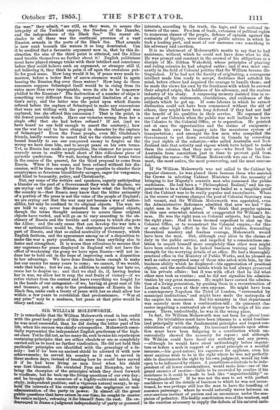TOPICS OF THE DAY.
WHAT WE A RR STILL FIGHTING FOR IT the merits of a cause were always- to be estimated by the tem- perond devices of its advocates, men of common candour and in- telligence would have little difficulty in deciding between the two parties which, for the sake of a, compendious designation, are known simply as the Peace and War parties in this country_ While, with few exceptions, the clamourers for peace are allowed by their opponents to be actuated by honest though mistaken notions, the latter are generally set down as men. under the influence of cor- rupt motives or &image passions ; the leaders pandering, to popular. prejudice for the sake of pecuniary profit or selfish ambition, their followers the slaves of ignorant enthusiasm, blind hatred, and sanguinary fury. In the. hands of the apostles of peace, the olive branch turns to a bunch of rue ; and while the pugnacious Bright. finds in his pacific mission the widest scope for, the passions that lead men to war upon each. other, even the rhetoric of. Mr. Glad.,- stone becomes turbid and stormy under the same influence, and the smoothness of the stream is broken by 'unwonted explosions of a corrosive gas, whose presence no one suspected under the melli- fluous sweetness of the " full:lowing river of his speech." Andes acrimony towards. those who differ from them is the characteristic manner of these gentlemen, their-matter-is chiefly irrelevant decla- mation and direct misrepresentation, in about equal proportions. The irrelevant declamation consists in appeals to the natural hor- ror of mankind at the sufferings inflicted by war, in harrowing descriptions of battle-fields strewn with mangled corpses, and men groaning out their lives in agony; of military hospitals foul with neglect and hideous.with misery ; of hardships in the trench and in the camp; of sorrow-and mourning in the widowed and orphaned homes. All this would' be very much to the purpose if men in our time and country were at all likely to overlook it, or to be insen- sible to it, and to, the heavy expense in money and in retardation of improvement which war entails. All this was very much to the purpose when it was in question whether we should embark in the-contest—whether the possible advantage was tij weigh against the certain mischief. But the nation which has passed through one stage-of. the, siege of Sebastopol knows as much and feels as muoh of the horrors of war as-any philanthropist,. Quaker or Mys- tic. And, however much it knows and however-much it feels, it knows. and feels so much the more that. such a price must not be. paid for-nothing; that,the justification of the war lies in its com- plete success, in- its winning for the Allies and for the world the blessings of a peace that shall no longer depend, on the caprice of a despot or the mistakes of a diplomatist, but on the manifested power and-will of the two greatest nations in Europe to stop the- march of the Muscovite armies considerably North of Constautia nople. And this-brings us to the. second point we have noticed as cha- raoterizing the arguments of the Peace party. After abusing their opponents as savage or selfish miscreants, and overwhelming:them with descriptions of the horrors of war, which nobody disputes, they turn upon them with the argument, that, even allowing the war to have been just in its origin, it has entirely changed its charac- ter since the Vienna Conference ; and that, especially since the South side of Sebastopol has fallen, all the legitimate objects of the war are answered, and its further continuance is unnecessary, in- politic-barbarous, end perilous. The Spectator has so frequently discussed the real change that was introduced into the-war by-the unsuccessful termination- of the' Vienna Conference, that it is un- necessary to do more now than reiterate, that. Russia proposed no modification-of "the third point," offered to accept no modifica- tion proposed by others, and displayed a fixed determination to render the Conference nugatory for all purposes but delay that might be of advantage to her. It is one of the most striking.proofs of the way history forme itself, that the real feats of the Vienna Conference should have. been turned into a- palliative of Russian. policy, and made an occasion of attack upon the warlike propensi- ties of the English Government. But the capture of Sebastopol.is a definite event, the real nature of which is unassailable by sophis- try or misrepresentation. It is upon' the change effected in the war by this event that the Peace party now mainly relies, as-it is by this change that hopes are entertained of drawing over to its.side the- Conservative or Derhyite section. of acting politicians, and with.them the great body of country gentlemen, clergy, and inhabitants of the rural districts. And, it is agreeable to get away from facts clouded by the mendacious narratives of diplomatists,—unable. to express themselves with straightforward plainness even if they have no intention to deceive, or not choosing to do so lest they should ac- quire the unprofessional habit of telling the. truth,—to facts stand- ing clearly out to the knowledge of us all. What, then, is really the change made in the war by the recent successes of the Allies? and is the change such that to choose or reject peace lies with the 'Western Powers any more than before—that the responsibility of the war is henceforward upon their shoulders and not upon the Emperor and Government of Russia ? Before Sebastopol was taken, we should have accepted the ve- lniatary limitation of the Russian fleet in the Black Sea, as a still'- dent guarantee that her designs on Turkey were suspended. Through that concession the object of the war would have been obtained, and the military superiority of the Allies acknowledged. We wish for no stronger statement of the objects of the war, both then and still, than our opponents, in their more reasonable moments, are in the habit of confessing. " The main objects of the war,"' they admit, "are still, as they were, to seeure the integrity of the Turkish empire, the freedom of' the Danube, and the independence of the Black Sea." The recent ob- stacles to all these was the continual presence of a vast Russian armada in the ports of the Black Sea. That armada is, now sunk beneath the waters. it so long dominated. Can it. be credited that a favourite argument now he that by this de- struction the aim of the third point is. attained, and the Allies need trouble themselves no further about it ! English politicians must have played strange tricks with their intellect and conscience before they could believe such an argument, or stranger still if, not believing it, they think to palm it off upon the credulous pub- lic for good sense. How long would it be, if peace were made to- morrow, before a better fleet of screw-steamers would be again bearing the Russian flag over those waters ? How long do these reasoners suppose Sebastopol itself would he in rising from, its ruins more than ever impregnable, were its site to be tomorrow yielded to the Russians ? The destruction of a- number of ships is something very different from the perpetual limitation of a na- tion's navy, and the latter was the point upon which Russia' refused before the capture of Sebastopol. 'to make any concessions that were not trifling with the proposal. Since Sebastopol was captured, has she offered this concession ? That is, the point, in the fewest possible words. Have our victories wrung from her a single offer that she had before refused ? If not, (and we have heard no one bold enough to assert the contrary,) how can the war be said to have changed in character by the capture of Sebastopol ? Even the Peace people; even Mr. Gladstone's friends, hardly venture- to assert that we the victorious party are bound humbly to sue our. conquered. enemy to forgive us the wrong we have done him, and to accept peace on his own terms: Yet, as Russia has. made- no proposition, the clamour for peace can scarcely mean in reality much short of this ridiculous piece of' quixotic quakerism. We wait, having before offered terms twice in the course of the quarrel, for the third proposal to come from Russia. When it has- come, and been refused without fair dis- cussion, will be time enough for the Peace apostles to slender their' countrymen as ferocious bloodthirety savages, eager for vengeance, and blind to humanity, policy, and. Christianity. But, say some of the writers and speakers, eagerly anticipating a blunder on the part of a Government they wish to displace, we are crying out that the Minister may know what the feeling of the country is—that Russia may know that the bitter animosity of a portion of the press is not the voice of the people of England ; we are crying out that the war may not become a war of nation- alities, but may be confined to, its original objects: The war, we are bold to say, never has departed from its original objects, though the terms thought necessary to secure those original objects have varied, and will go on to vary according to the ob- stinacy of Russia and the trouble and expense to which she puts, the Allies; and the-only cause that can develop the war into a war of nationalities would be, that obstinate pertinacity on the part of Russia, and' that so-called neutrality of Germany, which English factions, and the appearance among us of a.disposition to make the war a party question, do more than anything else. to foster and strengthen. It is worse than ridiculous to assume that any eagerness for peace displayed' in England will not have the effect of weakening the. grasp we have upon Russia—will not in- duce her to hold out in the hope of improving such a disposition- to her advantage. We have done Russia harm enough to make her. our enemy for many years to come ; we cannot, if we would, undo that harm.; but we can, in addition. to making her hate nay. cause her to despise us ; and that we shall do, if, having beaten her in war, we allow her to reap the real fruits of victory—if we retire victors from the contest and leave everything we fought for in the hands of our antagonist--if we, having at great cost of life, and treasure, put a stop to the predominance of-Russia in the Black Sea, make such a treaty of peace with her as shall allow her.' within a few years to_ rebstablish that predominance. "War at any price" may be a madness, but peace at that price would be idiocy and:ruin.



























 Previous page
Previous page